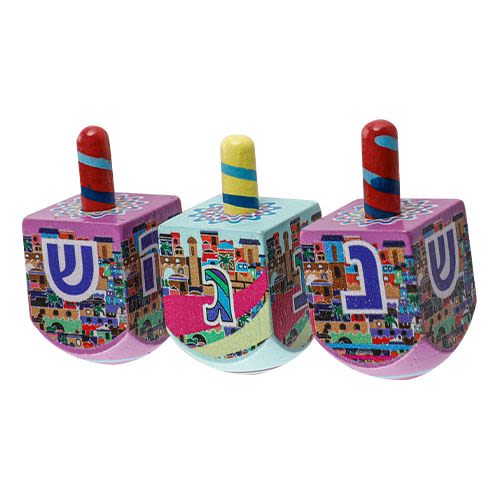
Being Sensitive
I experienced a miracle – I was saved from my own stupidity. One of my neighbors, a thirty-five year old mother of ten, is presently undergoing chemotherapy....

"You should be able to feel another's troubles in your own heart. This is especially true when many are suffering.
"It is possible to clearly realize another's anguish, and still not feel it in your heart.
"When an entire community is in distress, you should surely feel their agony in your heart. If you do not feel it, you should strike your head against the wall.
"[What does it mean to 'strike your head against the wall?'] You should strike your head against the walls of your heart. This is the meaning of the verse (Devarim 4:39), 'Know this day and realize it in your heart.' You must bring the realization from your mind to your heart. Understand this well.
"We later heard that the Rebbe once said that this is the meaning of the passage (Yeshaya 38:2), `And Chezekiah turned his face to the wall.' The face that he turned was his awareness, bringing it inside the walls of his heart. For one's true face is his mind, which illuminates it from within" (Sichot Haran 39).
* * *
I experienced a miracle – I was saved from my own stupidity.
One of my neighbors, a thirty-five year old mother of ten, is presently undergoing chemotherapy. She's fighting for her life, and needs lots of cheering from the sidelines to keep her going.
That's where I come in. I like to make people smile, and can usually come up with a good story. My neighbor enjoys it when I come to visit. She says that I'm one of the few people who treat her as if she's still normal.
[As long as I'm writing about visiting the sick, let me tell you about one of my biggest blunders. I was visiting a friend in the oncology department, which, as I'm sure you realize, is not the most pleasant place to be. The moment I entered my friend's room, her roommate, who happened to be a friend of mine as well, looked up at me and said, "Hi Debbie! What are you doing here?" I had no idea that the other woman was also ill! A little taken aback I replied, "Oh, what a pleasure to see you here." The moment the words left my mouth, I realized that they were not appropriate and turned a bright red. Later, I was told that the patients laughed at my stupidity for close to a week, so I guess it really wasn't that dumb….)
I offered to show my neighbor an English-language play on my computer, and since she doesn't understand English, I offered to give her a running commentary.
In Beit Shemesh, Israel, there is a wonderful English speaking theater group that annually produces a Broadway caliber women-for-women musical. One of my neighbors purchased the DVDs for "The Gift of Music," the story of a young seminary student who plays nanny for a motherless family and "Oliver with a Twist," the adventures of a London waif discovering her Jewish roots.
I have a soft spot in my heart for the original musical "The Sound of Music." As a child, my mother would sing "Climb every Mountain," as she went about her housework. I would wonder when I would finally be all grown up, as in "I am seventeen going on eighteen…" With so many wonderful memories from my childhood, I couldn't wait to share the beauty of "The Gift of Music" with my very ill neighbor.
Thank God, my teenage daughter watched "The Gift of Music" before I had a chance to show it to the neighbor, and I, of course, watched it with her. As I viewed the scenes of little children telling their older sister how much they missed their Mommy, and of the young widower trying to cope with a houseful of motherless children, I realized how totally inappropriate (to say the least!) it would be to show this movie to a woman fighting courageously to keep her children from becoming orphans!
I was saved from my own insensitivity.
It's not easy to put ourselves into another person's shoes, to imagine how that person is really feeling as he copes with his unique challenges. But that is what is expected of us as God-fearing Jews. It means thinking in terms of another person's perspective, not just in terms of our own perspective.
It is our duty to try to avoid causing others pain with our words (onas devarim) – and to do that we must take a few moments to consider someone else's feelings. There are many halachot about this. We are not, for example allowed to say something negative to a convert about his birth-nation. But in addition to learning the pertinent halachot, we have to use our brain! When the Rebbe said "bring this realization from your mind to your heart," he meant to use our minds, to think of all the angles, and then take that knowledge and make it real by integrating it into our emotional makeup, and not just processing it as an intellectual exercise.
I once read that the longest distance is the distance between the brain and the heart. Making intellectual knowledge into an emotional reality is one of the greatest challenges facing each and every one of us.
In Kriat Shema we say, "So you shall put these, My words, on your heart." Why "on your heart?" Because this means bringing something "into" your heart is accomplished through first putting it "on" your heart. In other words, to perform the right actions, to act "as if," even if we are not really "there" yet. That's not being hypocritical. We want to be sensitive, kind, caring, giving, etc., and the way to integrate those lofty ideals into our emotional being, into our heart, is to behave as sensitive, kind, caring, and giving individuals. Putting these words "on your heart," acting "as if" is a tool for bringing out intellectual knowledge into an emotional reality, to internalize what we know to be true. It's a tool for bringing our intellectual awareness "inside the walls of [our] his heart."
Another Blooper
Twenty years ago, I shared a room in the maternity ward with a woman who had once been a very close friend, but with whom I had completely lost contact. During the three days we spent together, in addition to bonding with our infants, we renewed our friendship and made a firm commitment to remain in touch. Several months later, I phoned my newly-found friend and had a friendly conversation about nothing in particular. I noticed that my friend was extremely reserved.
Just before saying goodbye, I asked, "Oh, and how's your little one doing?"
I was answered with silence. After several long minutes, she replied, "Oh, you didn't hear? I thought that's why you had called."
"Hear what?" I asked, still not comprehending.
"The baby died."
"Oh, I'm so sorry," I answered, and then, like a total idiot, I hung up the phone. I couldn't cope with anything as enormous as a baby's death. Such pain was beyond anything I had ever experienced.
The moment I hung up the phone, I realized how insensitive I had been. I was so embarrassed at my reaction. How could I have done that? But, thank God, Hashem gave me the moral courage to call her back a few minutes later to apologize for my behavior, and then empathize with the pain she was feeling.
Everyone makes mistakes. Everyone accidentally says things that will cause pain to another person. We're human beings; it's impossible for us to really know what's going on in another person's life. We meet a friend who has always been overweight and compliment him for having lost twenty pounds, only to discover that that the weight was lost due to a serious illness. We ask another friend, "And how's your wonderful wife?" only to find out that the seemingly perfect couple is in the midst of a very messy divorce. We complain about the baby that kept us up all night, only to learn that the person to whom we were complaining has been challenged with infertility.
But when we do make a mistake and say something painful, we should do everything in our power to try and correct that mistake, even something as simple as saying, "I'm sorry. That was insensitive of me. I didn't think." That, too, is using our brain – taking our intellectual understanding to a real, honest, emotional level.
Prayer
I once attended a lecture where the lecturer was discussing how the mitzvah of watching our speech involves, among other things, thinking of how seemingly innocent remarks might affect the listener – and to be sensitive not to cause our listener pain. She wanted to give an example, but said that she was afraid that any example she might possibly give would cause pain to someone in the audience. Finally, she said, "Here's an example that I am sure will not strike a painful chord in any of my listeners." She proceeded to give an example from our rabbis – Paloni's brother died by hanging. If Aloni and Paloni pass a butcher shop, and Aloni tells Paloni, "Oh, look at that hanging salami," Aloni would be causing pain to Paloni, by reminding him of his brother's unnatural death. I happened to know, however, that one of the women in the class had a brother who had been killed through hanging!
The lecturer had done everything in her power not to say anything that would cause emotional pain to her listeners. In addition, she will probably never find out that her example was inappropriate. But the Torah forbids onas devarim, causing pain with one's words!
What are we supposed to do? How can we prevent ourselves from causing pain to others?
That's where prayer comes in. Yes, many things are beyond our control. We can do our utmost, and still fail. After we've learned the halachot and tried our best to think of the other person's perspective, we must turn toward Hashem and ask Him to protect us from inadvertently harming a fellow human being through our words and our limited knowledge of their inner world.
That's the only way.











Tell us what you think!
Thank you for your comment!
It will be published after approval by the Editor.